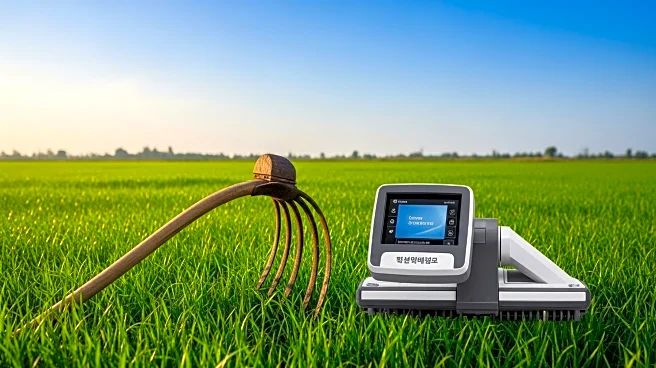What is the story about?
What's Happening?
Ghana has initiated the construction of a $5 million solar power facility aimed at transforming the country's agricultural practices. The project, part of Korea's Water-Energy-Food Nexus Project, seeks to address food security by integrating renewable energy with irrigation systems. Energy and Green Transition Minister John Abdulai Jinapor emphasized the project's role in linking climate action with food security. The solar plant at Dawhenya is expected to increase Ghana's renewable energy stock and improve agricultural productivity, which currently relies heavily on rain-dependent farming. The initiative includes training ministry staff and technical assistance, with completion anticipated within eight to twelve months.
Why It's Important?
The collaboration between Ghana and Korea represents a significant step towards addressing food security and climate change simultaneously. By enhancing irrigation systems with renewable energy, the project aims to reduce Ghana's dependence on rain-fed agriculture, which has contributed to food inflation and economic challenges. The initiative is expected to boost local rice production and create green jobs, particularly for young people and women. The project's success could serve as a model for other regions, demonstrating the potential of international partnerships in tackling complex development issues.
What's Next?
Ghana plans to expand its irrigation efforts, targeting over one million hectares within five years. The rollout will begin with 400 solar-powered water pumps in 2026, scaling to 3,500 pumps by 2028. The government is negotiating tax exemptions on imported materials to reduce project costs. The partnership with Korea brings technical expertise, with institutions like the Korea Association of Machinery Industry and Kunhwa Engineering providing support. The project aims to produce quality rice seeds and enhance agricultural value chains, contributing to Ghana's economic growth and sustainability goals.
Beyond the Headlines
The project highlights the interconnected nature of modern development challenges, emphasizing the need for clean energy, water, and food security. The collaboration between Ghana and Korea showcases agricultural diplomacy, linking Ghana's 'Feed Ghana' Programme with Korea's 'K-Rice Belt' initiative. The initiative underscores the importance of multi-agency cooperation in successful development projects, involving various Ghanaian institutions. The solar plant represents a shift towards integrating renewable energy with agricultural practices, offering a template for replication across other regions.
















